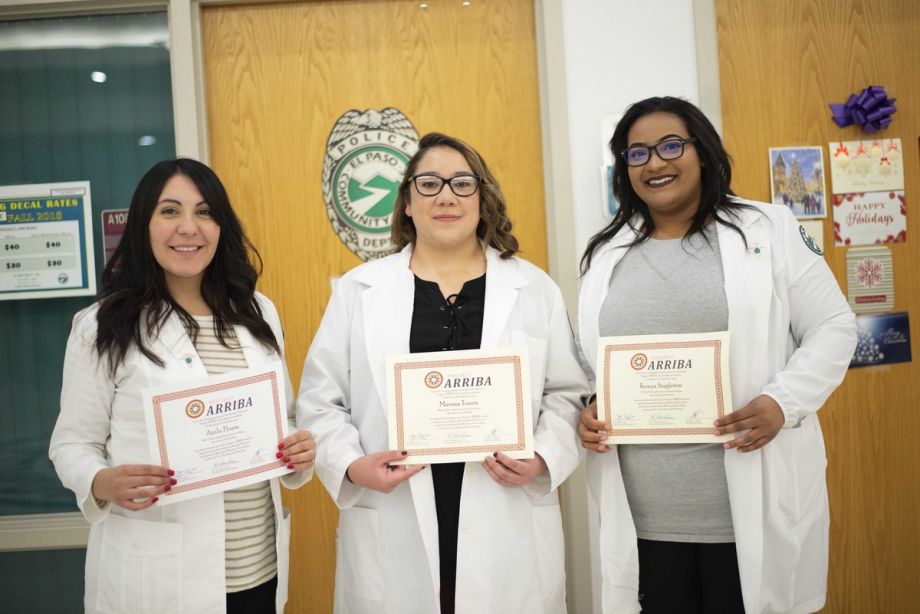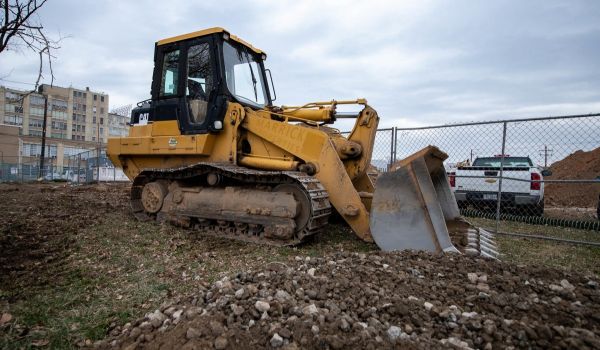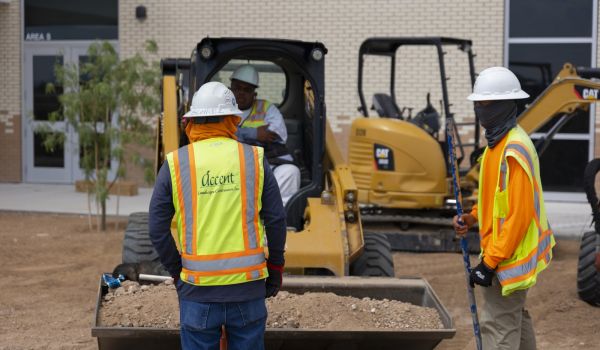This story was co-published with El Paso Matters as part of our joint Equitable Cities Reporting Fellowship For Borderland Narratives.
An ordinary flyer posted on an El Paso Community College campus wall changed Candy Gutierrez’s life.
As an EPCC student, Gutierrez wasn’t sure if college was for her, nor did she feel confident that she had the discipline to pursue a professional career. Then she noticed a Project ARRIBA flyer offering to help students earn a profession. She signed up.
Last week, thanks to the financial assistance, guidance and mentoring that the local nonprofit Project ARRIBA offers to its clients – primarily low-income Hispanic individuals – she graduated with a nursing degree from the Texas Tech University Health Sciences Center El Paso’s Hunt School of Nursing.
“Being a part of the program helped ease the stress of financially covering tuition, scrubs and equipment, and helped me focus on more important things like school,” she says. “Without Project ARRIBA, I would have faced additional challenges that could have possibly given me enough reason to not follow through with the nursing program.”
Over the past 23 years, Project ARRIBA — Advanced Retraining and Redevelopment Initiative in Border Areas — has helped about 1,800 participants graduate. Project ARRIBA also helped more than 1,600 individuals with job placements. Project participants earn, on average, $49,000 a year in high-demand careers, such as the medical industry.
“Our mission is to assist economically disadvantaged individuals in gaining the education and job skills needed for demand occupations that pay a family-sustaining, living wage in El Paso, Texas,” says Roman Ortiz, president and CEO of the local workforce and economic development initiative.
On Dec. 15, the El Paso County Commissioners Court unanimously voted to award Project ARRIBA with $1 million in American Rescue Plan funds so the nonprofit can continue its work. The funds would be spread out over two years. “We could see about a 30% increase in overall growth,” Ortiz says. “This would essentially help us bring in twice the number of new participants over the course of the next 24 months. Last year, 84 cents of every dollar went to program services.”
The organization connects students wanting to acquire higher skills with an industry needing a skilled workforce. “To me, this is one of the most successful programs that I’ve seen,” says El Paso County Judge Ricardo Samaniego. “It comes at a very important time when we need medical personnel.”
‘Tax takers to tax makers’
A Hunt Institute for Global Competitiveness study released in May 2021 stated that for every $1 invested in Project ARRIBA, the local economy receives $28 back. Ortiz says the program’s 2021 graduates are earning more than $52,000 a year.
Graduates from the program have contributed about $175 million to the economy in taxes to the city, county and state, Ortiz says. “We’re looking at the next 20 years, and we have a great opportunity here to make some major changes with the high need of employment,” he says. “Our people go from being tax takers to tax makers.”
The organization’s innovations lie in its intense participant-centered case management approach, where students are guided, motivated and empowered. Case managers work with them to access training and services, monitor the participant’s progress and effectiveness, and provide counseling and accountability.
“This support increases accessibility, persistence, and graduation rates at the local junior college and university,” Ortiz says. “Project ARRIBA case managers play a pivotal role in the program’s high retention, graduation and job placement rates and maintain a student-to-case manager ratio of no more than 60 to 1.”
ARRIBA spends about $6,500 per participant for about two years to help them obtain postsecondary training in occupations such as nursing and other healthcare-related jobs.
“Over the last two decades, our [return on investment] is phenomenal, with over $890 million in economic impact to the El Paso community,” Ortiz says. “I am proud of the almost 2,000 families that work in El Paso in the areas of most need, like nursing and healthcare.”
‘Innovation that can be copied elsewhere’
Project ARRIBA was created in the late 1990s by the grassroots organization El Paso Interreligious Sponsoring Organization (EPISO), which is responsible for bringing water and sewage service to more than 100,000 people in El Paso’s unincorporated, low-income colonias. It began as an organization wanting to get better housing for the people in the region.
“We found out early on that, more importantly, we needed some occupations and work that would pay a living-wage salary,” says EPISO leader Eloiso De Avila.
When Project ARRIBA started, factories were closing in the area, displacing workers. At the same time, some high-paying jobs were vacant due to a lack of workers with the available skillset to perform those duties, says EPISO leader organizer Surya Kalra.
“This labor market intermediary concept is to train people that are not making very much money for these jobs that are actually in the community,” she says. “Project ARRIBA is part of a strategy.”
In 1998, ARRIBA was incorporated as a public, nonprofit El Paso-based economic development initiative. As a model, De Avila and others in EPISO looked at Project Quest in San Antonio, a nonprofit that specialized in specific job training — the very thing EPISO wanted to bring to the people of El Paso.
“We grew from that experience and gathered institution leaders, priests, and people and the business community in El Paso to come up with this program,” says De Avila. “We do ‘house meetings.’ We gather a group of people together and try to find out what is happening with them. What ails them, and what is it that can be done to improve their lives?”
Rev. Ed Roden-Lucero, one of the project founders and a prominent local leader, says that by 1997, Project Quest already had a 10-year track record of success.
“We believed that it was possible to adapt it to the city of El Paso and El Paso County needs,” he says. “At the time, the unemployment rate in El Paso County was pretty severe. People didn’t have the resources to go back to school. People at the very bottom of the economic ladder … they had zero opportunities to advance themselves. Especially those who live further out in the county and don’t have transportation.”
The San Antonio-based organization’s workforce model has been replicated around the Southwest – Austin, Houston, Dallas, the Rio Grande Valley, Tucson and Phoenix – as well as in Monroe, Louisiana, Des Moines, Iowa, and abroad.
Project Quest continues its efforts in San Antonio with more than 2,000 participants, which resulted in close to 600 graduates and 300 job placements across three dozen in-demand occupations. Graduates make an average of $21.56 hourly, according to their 2021 annual report. During its 29-year history, the organization has served more than 8,200 participants with a 91% job placement rate.
“These strategies around labor market intermediaries didn’t just happen in El Paso and San Antonio,” says Kalra. “There’s now 13 of them across the southwest region. We convene ourselves as organizations, both the grassroots and with the workforce projects, so they can learn from one another. You’ll see innovation in one place that can be copied elsewhere.”
This story has been corrected to reflect the latest numbers on Project ARRIBA’s graduates and job placement.

Christian De Jesus Betancourt is Next City and El Paso Matters' joint Equitable Cities Reporting Fellow for Borderland Narratives. He has been a local news reporter since 2012, having worked at the Temple Daily Telegram, Duncan Banner, Lovington Leader and Hobbs News-Sun. He's also worked as a freelance reporter, photographer, restaurant owner and chef. Born and raised in Juarez, El Paso became Betancourt’s home when he moved there in the seventh grade.
















